#Read Umineko btw.
Text
Thoughts on the tragedy of Gojo Satoru and narrative cruelty towards him as of JJK 261.
Some notes before we start.
1) This originally was going to be an analysis about how Gojo is Megumi's dad. Then JJK 261 came out and shattered my heart into millions of pieces.
2) This analysis will briefly deal with suicide.
3) The light novels are canon and provide critical insight to characters and their motivations. I would go as far to say they're the equivalent of Bleach's CFYOW for JJK. I will be citing the official translation from my own copies. There is a fan translation (Book 1 & Book 2), but the syntax is a bit clunky to read. Either version is fine, I just highly encourage reading them.
4) I will be mainly using the TCB scans for the manga because of their accessibility.
5) Read the light novels.
(Click pictures for captions/citations.)
Preface
Umineko no Naku Koro ni (When the Seagulls Cry) is a visual novel about a person who is fundamentally misunderstood by those around them. They desperately want to be loved without being perceived, believing themself to be unworthy due to trauma and immutable characteristics given to them at birth. Instead of telling anyone these feelings directly, they play games akin to torture. They torment the ones they love over and over in hopes they'll see through their actions and understand them.
"Without love it cannot be seen."
If you've ever heard of Umineko, you've probably seen this quote. It's the lens in which you are supposed to view the contents of the novel in order to understand the heart behind the actions.
Keep this all in mind as I attempt to answer the following question:
What's wrong with Gojo Satoru?
Short Answer: Being the Strongest. He never got over the trauma inflicted by Toji that was worsened by Geto. And because he's the Strongest, he never sought help for these problems. I’m not going to explain why this is the case here—we’re just accepting this as canon for this analysis. How this trauma manifests and affects his interpersonal relationships is the focus here.
Regardless of trauma, Gojo Satoru is a fascinating character in that he is simultaneously a egotistical arrogant dickhead and a deeply caring individual. He's not one or the other, he is both at the same time at all times. Allow me to explain how he pulls this off.
2 Birds 1 Stone
Gojo Satoru is a 2 birds and 1 stone kind of guy. What I mean by this is that Gojo will do 1 thing and have 2 reasons behind it. The reasons often seem contradictory which leads fans and characters to have a polarized view of Gojo based on how they feel about him. If you hate Gojo, you will only see the bad/selfish reason. If you adore Gojo uncritically, you will only see the good/selfless reason.
This is why without love, it (Gojo's heart) cannot be seen.
I will now provide examples of this 2 birds 1 stone action.
Ijichi Kiyotaka
Ijichi and Gojo’s relationship is the best to start with because it teaches you how to read Gojo’s words vs his actions/results. We all know Gojo is very blunt in an rude way. This is at its extreme when he’s with Ijichi as seen in the following panels.

Gojo straight up tells Ijichi he’s useless as a sorcerer in a way that makes him cry. It’s definitely bullying, but it’s not to torment Ijichi even though it seems that way. Ijichi comes to understand Gojo was just trying to make sure he wouldn’t die. This particular scene took place right after Haibara died, Nanami quit, and Geto defected. The harshness is how Gojo is choosing to say “Hey I care about your life, but don’t get too close to me, I can’t handle that.”
Gojo was even kind enough to offer a productive alternative that let him participate in Jujutsu society without risking his life—driving a car and putting up veils.
Still, Gojo’s bullying of him is a lot. It makes Ijichi doubt that Gojo even likes him. Gojo has to spell it out that he trusts Ijichi the most. Ijichi being weak means he cannot betray Gojo like Geto did, therefore Gojo can fully trust him. Still, Gojo is aware his weakness is other people, so as The Strongest, he can’t let him in all the way. This leads to him showing affection/care in the most insane ways possible. (It’s not really a surprise people don’t understand him when he uses this plausible deniability model.)
ENTER: JJK Thorny Road at Dawn, Chapter 3 Asakusabashi Elegy
As stated in CFYOW, Gojo is aware of Ijichi’s stress and went out of his way to help him deal with it.
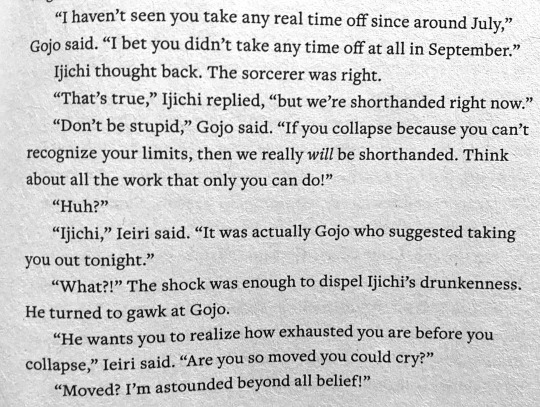
Not only does he recognize the stress and notice he hasn't taken time off for it, but he also pinpoints the reason so well that it moves Ijichi to tears. (Summary of Pages 75-77: He feels guilty for failing Yuji twice. Gojo assures him it’s not his fault and flicks him on the forehead.)
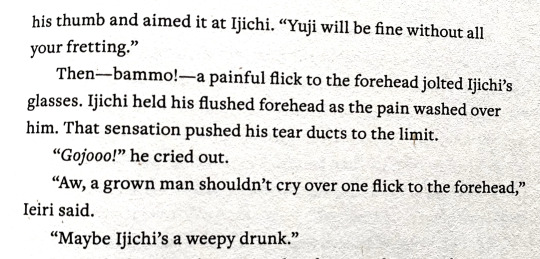
But! Gojo can’t be too affectionate. The very next day he piles a good deal of work on Ijichi’s desk he is aware will be stressing him the fudge out. (See Pages 78-79 for full context.)

It should go without saying that treating Ijichi like this is not ok. My point here is to demonstrate that despite being a massive asshole, Gojo does care.
So what did we learn here?
1) Gojo is aware of people’s emotional problems to some extent.
(IDing Ijichi’s stress source accurately.)
2) Gojo is aware he is unable to deal with emotional problems on his own so he enlists outside help.
(Having Shoko and alcohol help cheer Ijichi up while he talks to him.)
3) Gojo’s bluntness and flippant behavior is both rude and serves a purpose for the recipient.
(Gojo bullying Ijichi to keep him out of harm’s way.)
4) Gojo packages his affections with cruelty to keep people at a distance.
(Gojo flicking Ijichi on the head while telling him to take it easy. Taking Ijichi for a night out and then burdening him with extra work the next day.)
5) Other people do not understand Gojo and misread his intent all the time.
(It took Ijichi about 10 years to realize Gojo cares deeply about him.)

Nanami Kento
ENTER: JJK Summer of Ashes, Autumn of Dust, Chapter 2: Resurrection Doll
This chapter is so good at fully fleshing out the Gojo Nanami dynamic that I will not be using manga citations for most of this part. Please read it. Or listen to the official audio drama which has been fan translated.
Gojo spends the first half of this chapter messing with Nanami, forcing him to try unique foods and drinks and generally enjoy himself. You know the typical purposeful Gojo bullying. (See Pages 33-38)
Then it gets rather serious when they arrive at their mission’s destination. They have to deal with a grieving mother. Gojo is blunt. Nanami is comforting. (See Pages 47-50)
What’s interesting about this interaction is how Gojo reflects on it. He acknowledges how bad he is at dealing with attachment issues that come from grief.
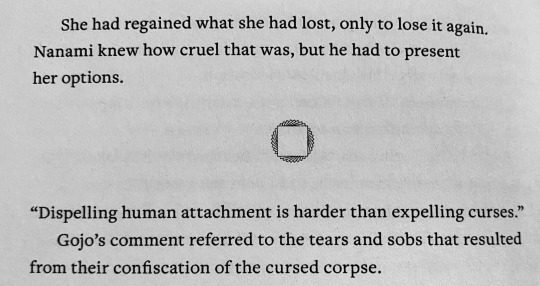
Gojo and Nanami find the culprit and the both of them are quite pissed at how he’s exploiting grief to make a profit. They kind of let him be tortured by the curses that eat his body for a bit before killing him. Gojo makes Nanami do it because he can make him die a human death. (See Pages 50-57)
Even after he has expressed hatred of his man for preying on grieving parents, Gojo still ultimately wants this person to have a proper death. This captures the duality of his inhumanity (torture) and humanity (merciful death) quite well.
The following bar scene ties this all together nicely. (See Pages 58-60 for full context.)
I want to note that it is constantly drawing attention to the sentimentality the both of them feel as they converse about how this particular mission messed with them.
As stated in CFYOW, Gojo believes adults treat their stress with alcohol and conversation. And yet, he denies himself the alcohol.
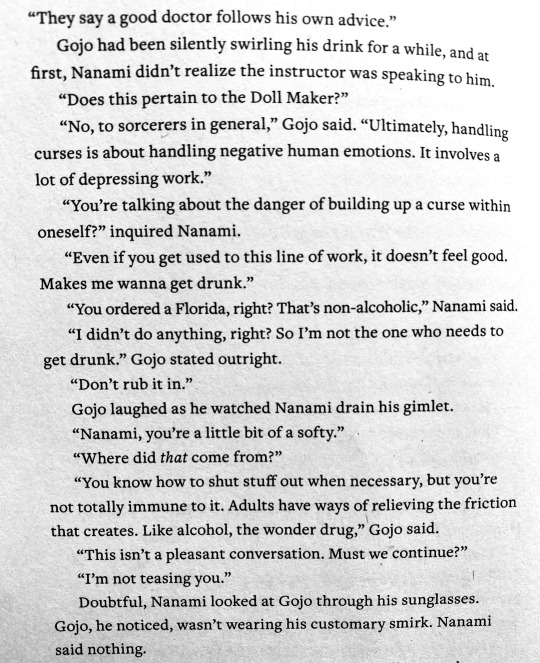
Gojo denying himself this stress relief seems to be a combination of him being too wary to let down Limitless and not believing he needs it. He's the Strongest and he has to be the Strongest at all times, otherwise someone like Toji will get him.
As stated in CFYOW, Gojo recognizes his students will face trauma similar to himself and Nanami and that as adults they must look out for them.

What's so heartbreaking about this interaction is how Nanami is painfully aware Gojo isn't following his own advice of stress relief and says nothing. In a way it almost reads like Gojo, who knows people see him as a giant child, is asking Nanami to help him too in the most roundabout way possible.
As stated in CFYOW, Gojo deliberately paired Yuji with Nanami because he recognizes he is unfit to keep him emotionally stable. (Also note he refuses to have Yuji’s humanity denied as Sukuna’s Vessel. His concerns are explicitly about Yuji as a kid and nothing else.)

Not only is this for Yuji’s benefit, but for Nanami’s as well.
As we know, Nanami and Gojo have one thing common: they lost their best friends because they couldn’t be there for them. This guilt motivates both their actions as adults. Using that connection through shared grief, Gojo is trying to help Nanami heal from that wound with Yuji.
Why Yuji? Nanami’s best friend, Haibara, was a cheerful, friendly boy with a big heart—just like Yuji. He may not be able to replace Haibara, but that familiarity helps Nanami move on. We know this worked because Nanami dies without regrets thanks to Yuji. (All while seeing Haibara too.)
This is called the Nanago Bible for good reason. We have Gojo being an absolute annoying dick to him and then doting on him so targetedly it kind of makes your head spin. Just like Ijichi, Gojo cares but he’s got to bully you first before he shows it. (Totally sane and healthy behavior. /s)
That's why this hurts so much.

This is so cruel. Gojo does all this for Nanami only to be misunderstood by him in the end, and learn that everyone else is the same way.
However, Nanami still cares for him. Like Gojo, Nanami doesn't show affection unless he's being kind of mean. The best example of this is Yuji calling him Nanamin. And to be honest, his whole stern father dynamic with Yuji.
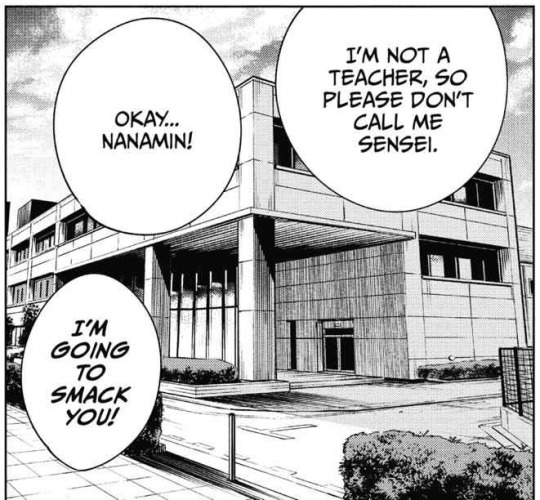
Nanami puts on a show here. He pretends this is pissing him off but he ultimately accepts it.
We've already established that Gojo is unable to fully understand other people. Nanami calling him a pervert/weirdo/self-satisfier was affection and Gojo too misunderstands him. So we're left with that panel of Gojo looking very hurt.
Iori Utahime
Similar to Ijichi, Gojo trusts Utahime because she is weak. And just like Ijichi, Gojo doesn’t say “I trust you won’t betray me like Geto”, he says this:
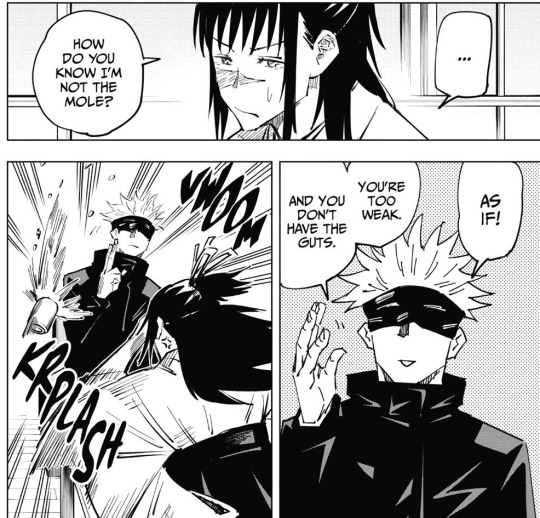
Not ignoring the misogynistic stint to his bullying of Utahime, Gojo has been doing this for so long that Utahime flat out hates him. It’s in her official character description. And Gojo is unaware of this because he can't read people well. But you want to know what else is? Her love of sports. (Baseball is one she's really into.)

After the disaster that was the first half of the Goodwill Event, Gojo makes the second half enjoyable for the students and Utahime specifically. 2 birds and 1 stone. Baseball means kids get to enjoy their youth and Utahime gets to have fun with something she genuinely enjoys. And Gojo gets to piss off Principal Yaga and Gakuganji as a treat.
Hopefully you can see the pattern now. Gojo cares for people while also being an absolute menace to keep them at a distance for what he believes to be their own good. And still he craves a direct connection with them. All of it is him failing to cope with Toji and Geto in a healthy way and being The Strongest.
Gojo's Heart
Now that we've established how to read Gojo's actions and words, let's take a look at his heart. What kind of person is Gojo Satoru really under all the posturing?
Other People
Though Gojo likes to act like he's above it all, other people are his weakness. This is not limited to other sorcerers, but the non-sorcerers as well. His attachment to people is so strong that it has been used by each major villain as an exploit. Toji used Gojo's fondness towards Riko to catch him by surprise, both Geto and Kenjaku used his sense of duty towards complete strangers to trap him, and Sukuna used Megumi to throw him off guard.
The Hidden Inventory and Shibuya Incident arcs in particular echo each other in set up and outcome—Kenjaku's plan being a finessed version of Toji's. Gojo panics over Riko and strangers potentially dying with the same expression as his weakness is exploited until he comes up with a solution on the spot. And these solutions ultimately fail to stop the villain from obtaining their goals. The difference between them is how Gojo follows up on the collateral damage. Post-Geto fallout, he starts more directly checking in on the people he potentially hurt.

The follow-up with Ijichi about Shibuya is illuminating. It reiterates that unconsciously Gojo created a domain on the fly that wouldn't be lethal to strangers, and it reveals that his cursed energy itself is hellbent on protecting others. What this indicates is that Gojo's soul is devoted to others. If he didn't care, none of this would be possible.
That being said, Nanami also isn't wrong to call Gojo a Jujutsu Pervert. Gojo does very much get off on fighting to the point where he starts disconnecting from other emotions. Just as the Hidden Inventory and Shibuya Incident showcased how much Gojo cares for other people, the same arcs showcased how unhinged Gojo is when left to his own devices.

He's both caring and a freak at the same time. Polarizing behavior included.
Gojo’s Students
Gojo cares a lot about his students, their enjoyment of life, and their futures. He also wants to change Jujutsu society without senseless bloodshed so he goes out of his way to recruit strong children with potential as his allies (Megumi, Yuta, Yuji, Hikari). Some may think he’s only using the youth for his own purposes. Others may think he just wants to help troubled youths. But it’s both. Gojo is doing both of these things. And boy does he feel immense guilt over it when it goes poorly. See how he handles Yuji "dying".

It should be noted that he still tries to maintain his jokey persona with Shoko and Ijichi while he genuinely gets upset. And he does this by bullying the tar out of Ijichi. (It's really no wonder the poor thing thought Gojo hated him.)

As stated in CFYOW, JJK Summer of Ashes, Autumn of Dust, Chapter 4: Ijichi at Work, Gojo’s style of care is one that is focused on helping the children handle the emotions he couldn’t at their age. (See Pages 116-118 for full context.)
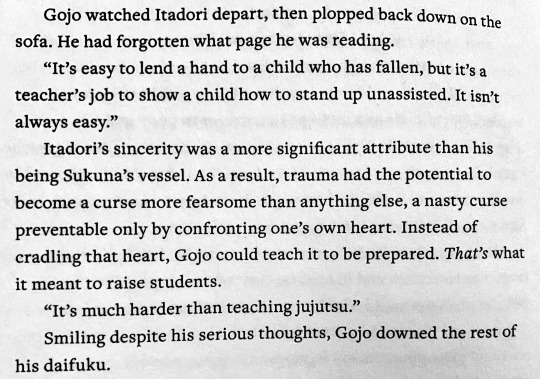
Gojo basically finds children who are like himself and tries to make sure they don’t wind up like him. This is how he has chosen to cope with his trauma.

You could read this as manipulative and selfish if you find Gojo unbearable. It did turn out poorly in the end. But remember how he forced Nanami to speak of Yuji as a person and not a vessel. And how Gojo discusses with him the fragile hearts of youth and how he wants to prepare them for grief. Gojo is anticipating Jujutsu society ruining their lives and acting preemptively.
Gojo also postures in front of the students. As their pillar of stability, he pretends everything is ok because he's the adult in charge. Look at how quickly he buries his grief when they notice something is up.

And each time he does this, it works. He definitely believes what he says and that does make him annoying. However, the students feel secure because he's promising to take responsibility. When he fails them, he blames himself and no one else. That's the attitude of someone that cares despite most of his students not seeing through his arrogance.
Geto Suguru
It's not up for debate that Gojo was in love with Geto. Gojo 100% was gay for Geto. What is up for debate is whether or not the two of them ever acted on it when they had the chance. I lean towards the interpretation that this love was never realized in life. (Gege is a huge fan of yaoi that ends in tragedy.)
I want to make it very clear, after reading the contents of JJK 261, I believe Geto is the one who failed Gojo the most. He had a fundamental misunderstanding of his best friend so bad that he abandoned him and was shocked that Gojo still loved him in the end. It took him until the afterlife to see that all Gojo wanted was him.

Gojo checking in on him wasn't enough, Gojo not killing him for 10 years even though he could've wasn't enough, Gojo saying something that caused Geto to blush before he killed him wasn't enough, Gojo dying and immediately greeting him first wasn't enough. This is when he finally understands.
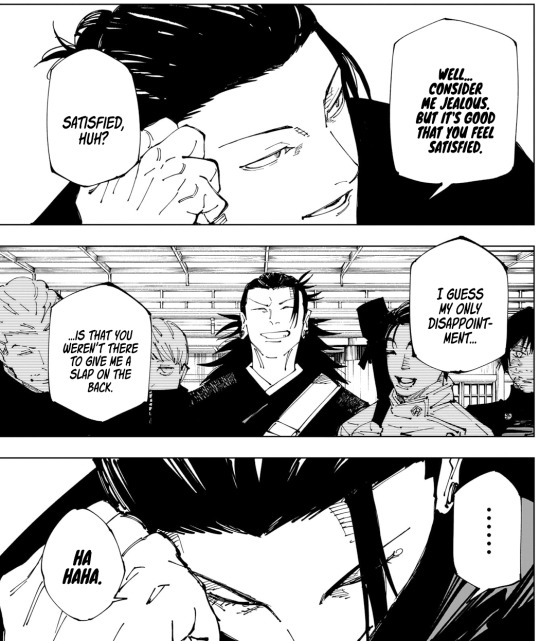
Before not denying the fact Geto saw Gojo as a self-satisfying Jujutsu pervert who cared about no one else.
Geto was too consumed by his own trauma and hang-ups to see Gojo with love. He wound up doing the exact same thing he killed non-sorcerers for; putting all the burden of their relationship on the strongest and expecting him to do all the work.
And yet somehow Geto was able to find the love Gojo also deserved. He made a family and was surrounded by people who openly loved him and even understood him. It makes me a little bitter.
At one point Geto did understand Gojo a lot. Enough to be his moral center and sense his suffering. He even accepted Gojo's awful personality when everyone else wouldn't. Since their breakup, Gojo has been mourning him. Every little thing Geto told him to do while they were together is something Gojo incorporated into his life.

Using the personal pronouns "Boku" and "Watashi" over "Ore" to be more polite? Done. Not killing ordinary people, even if they suck, because that would be pointless? Done. Even to the point where he spares most curse users or rehabilitates them. He takes care of Geto's family even after he's dead. Looking after the weak because he's strong? Done until it kills him.
Gojo is chasing after a Geto that no longer exists. These little rituals keep that ghost alive. And they turn out to be super beneficial to other people so let's make it another 2 birds and 1 stone that hides the fact he's grieving.
Gojo's Guts
In summary, Gojo does care about other people despite treating them in bizarre and unpleasant ways that aren’t ok. He may be using them as a way to work through his own trauma, but he is also determined to see that they live better lives than himself. 2 birds, 1 stone.
His status as The Strongest isolated him so severely that he was doomed to being misunderstood by everyone he loved. Both because of how Gojo treats them and how they treat his power. (Limitless being the metaphorical and literal barrier between himself and others.)
Gojo wants to give love and be loved but is denied it at every turn. His heart is that of a pathetic sopping-wet cat that pretends it's completely dry.
Narrative Cruelty
The narrative ire for Gojo Satoru cannot be overstated. This person sums it up the best.
After JJK 261, it has become abundantly clear to me that Gojo was intending to die the moment he made the date December 24th (the most romantic day in Japan and the death date of Geto Suguru). He has all this grief and guilt and truly believes that no one living will ever understand or care about him in the way he wants. The only one Gojo believes will understand him is Geto and he wants to be with him. (And that didn't pan out well either.)
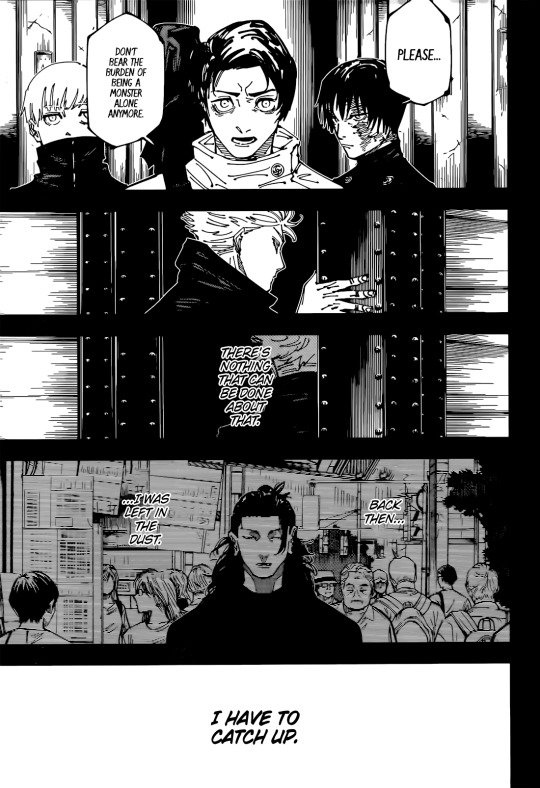
Gojo is also refusing to burden the students with being a monster even though they're offering. As an adult he is in the right to do his damndest to make sure the minors in his care don't become as broken as him. He knows being a monster sucks and his whole goal is to put an end to that.
Plus, he blames himself entirely for this situation in the first place. He's taking responsibility by killing the elders to ensure that when he dies, his students don't pay for it. In a way he's correct, failing to kill Geto properly because he loved him is why they're here now. Kenjaku exploited that love to seal him and Gojo knows it.
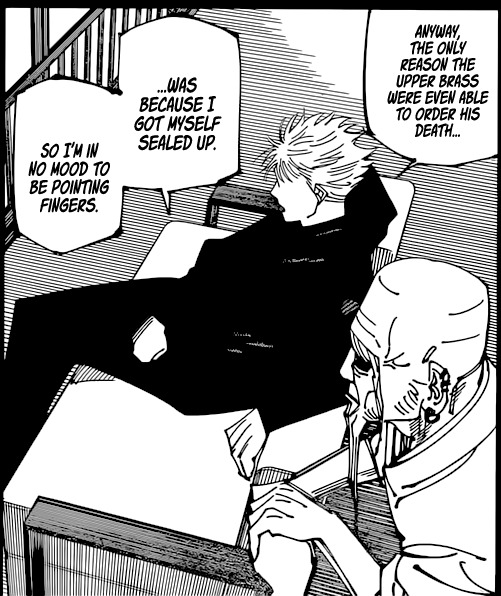
The Gojo vs Sukuna fight was Gojo effectively committing suicide to be with his one and only love who fundamentally misunderstood him in life and barely understands him even in death. And ironically, the one who kills him is the first and only person relate directly to his suffering and acknowledge him as himself. Sukuna frees Gojo from the title of Strongest and leaves him as Gojo Satoru, appreciating him as the one who cleared his skies.
This is so unbearably cruel it makes my stomach twist just thinking about it.
It's why I want Gojo so desperately to come back to life. I want him to experience love and know that he is loved. I want him to come to terms with his grief and work through it. But we don't get that. He dies and is surrounded by people that barely understand him while claiming to have no regrets.
What's the point of this narrative ire?
Japanese society is largely Buddhist. Detachment, a kind of Stoicism, is a tenant of Buddhism. Emotions are to be let go of. Ideally when they arise, you don’t cling to or bury them. A version of this idea from Zen Buddhism manifests in Japanese culture as a mantra known as Suffering in Silence or Gaman. In summary, if you're hurting, you hide it. That's the proper thing to do. It leans much more towards repression of emotions instead of their release/detachment.
JJK deliberately draws inspiration from Buddhist teachings and imagery so I'm assuming Gojo Satoru being the poster child for Suffering in Silence is intentional. Taking everyone's burdens and pretending it's all ok because he's the strongest and that's what you're supposed to do.
He took on most of the burden for protecting Amanai Riko and they both died for it.
He took on the burden of being stronger, going on missions for both Nanami and Geto while they grieved until they both left him.
He took on the burden of raising Megumi and Tsumiki and look at what happened to both of them.
He took on the burden of every student no questions asked, money food, dealing with higher ups, etc and all but 2 of them treat him kindly.
He took on the burden of killing Geto, which Principal Yaga forced onto him when he was 17 and it came back to bite him 11 years later in Shibuya where he took on the burden of dealing with that veil.
This is a cautionary tale demonstrating just how much this kind of mindset can ruin your life. JJK has always been a massive critique of Japanese societal standards. And despite Gojo rebelling against it, the toxic ideas a part of his upbringing are ones he can't let go of for himself. He believes he can't be fixed, so he paves the way for the future generation with all his body and soul.
That's why this is so cruel.
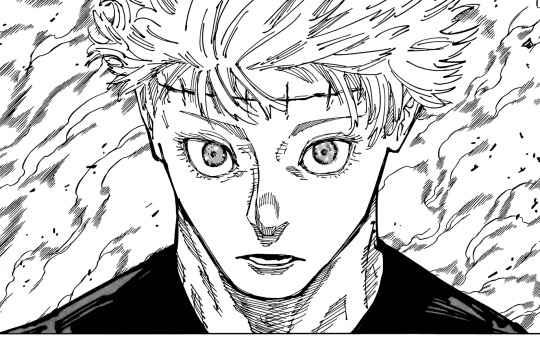
In life Gojo was treated like an object by everyone around him. His clan saw him as a tool for their glory and pushed everything onto him. The higher ups, Yaga, Nanami wanted to push everything onto him and they did when they could. You can say whatever mean thing you want to him because he can clearly handle it. You can assign whatever mission or task because he's reliable as the strongest but not as a person. He gave his life for others and even his body, only to be scorned by those very ones he's helping. (Think back to how he forced Nanami to speak of Yuji as a person and not a vessel. He doesn't want any of his students to be dehumanized like himself.)

Yuta is only person who stopped to ask if Gojo was ok. He's the only one that noticed his status as a monster was eating him alive. He's the only one who had a problem with everyone talking about Gojo's body like a tool. And to help him be less lonely he asked for explicit permission to be the one to desecrate it.

Gojo doesn't want his students to give up their humanity and be lonely or give their lives to win. He's ok with them taking risks if it means they survive (see Megumi). And from what it looks like, Yuta will be the only one to fully understand him (obtaining his memories and all) and then die as the result of it.
So in a cruel twist of irony, Gojo will have one person know him fully as a monster and they will likely die as the result of it, further justifying his self-isolation in the first place. It's a game he always loses no matter how he plays.
Sukuna wasn't really wrong when he called Kashimo greedy for wanting Love and Strength. With how their society is structured, they really can't have both.
Note: I'm leaving Yuji out of this because he had no idea this was the plan and always saw Gojo as his teacher first, aka a person. This is also his general reaction to Gojo going things alone.

There's still more...
I also want to note Shoko's reaction here is another instance of Gojo not understanding those around him. From her first official character profile it's noted that Shoko has finally quit smoking for 5 years because Utahime asked her to.
Now what is Shoko doing in that panel and during the entire fight? Smoking. She's just mirroring Gojo's own behavior towards her. Pretending everything is ok and saying nothing of her true feelings. After getting blown off emotionally by both Geto and Gojo as a teenager, Shoko gave up on reaching them.

Gojo did this to her for over a decade and she's doing it back to him. Not because they want to me mean to each other, they just don't know how else to deal with their own trauma. To an extent the other students are doing the same. They're just being like their Sensei.
Gojo went out on a suicide mission believing only Yuta and Yuji cared about him in life as a person. (Megumi's getting his own post and believe me it's not fun.) The 2 most empathetic characters were able to let him know they saw his heart. With love it was seen. Other people cared and didn't show it or they flat out treated him like an object. Gojo is both at fault and not at fault for this.
It hurts me a lot and it's very cruel, but I think this has severed its purpose. If you don't tell people how you feel, they'll never know. Emotions will eat you from the inside out and no one will notice because on the surface you look ok. There aren't a lot of people like Yuta who will take the time to look for your heart, so it's better to outright show it. Don't put off grief, it will consume you.
Gege Akutami...when I get you...
Another prominent theme of Umineko is how poorly readers treat the creators of the story they are experiencing. Often times fans will say and wish horrible things on the author when the story they like doesn't go the way they want it to. You're free to feel upset by how this story's direction and critique it to your hearts content, but please remember Gege is a person too. Don't do to Gege what everyone else has done to Gojo.
Remember: "Without love, it cannot be seen."
However JJK ultimately concludes, I make you this promise.
"This game story will not have a happy ending."
#cactus yaps#I kind of hate everyone but Sukuna Yuta and Yuji for how they've treated Gojo. But also I understand. He is a lot.#I don't think I've been this tormented over a character's fate since Sephiran Fire Emblem.#It's ok in my delusions Gojo will be free. If his body is desecrated then I will treasure his memory.#I'm also extremely worried Yutajo is going to be eaten by Sukuna. That'll really make me cry.#gojo satoru#ijichi kiyotaka#nanami kento#geto suguru#okkotsu yuta#jjk spoilers#jujutsu kaisen#jjk 261#Read Umineko btw.
156 notes
·
View notes
Text
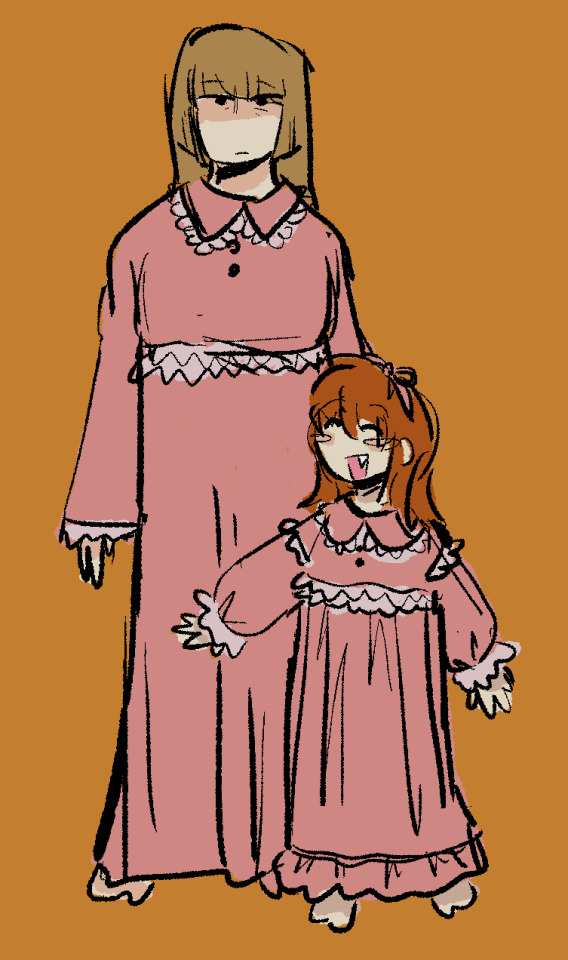
matching with mama
#my art#umineko#rosa ushiromiya#maria ushiromiya#originally i just wanted to draw rosa in pajamas cuz of a scene where genji comes to wake her up and i was like i would like to see it.#sleepy rosa. but i kept thinking about all these times by the point i was reading where rosa talks about how she doesnt feel like a mother#she feels more like a child and how it really informs the way she parents maria#so i wanted to draw her in matching pajamas with maria that looks like a childrens nightgown on her to show sort of like#her immaturity and how out of place she feels as a mother and how hard she is on maria for not acting her age#anyways...all those thoughts for what looks like a jcpenney photoshoot LOL#btw im still working on ep 2 no spoilers plzz...
317 notes
·
View notes
Text
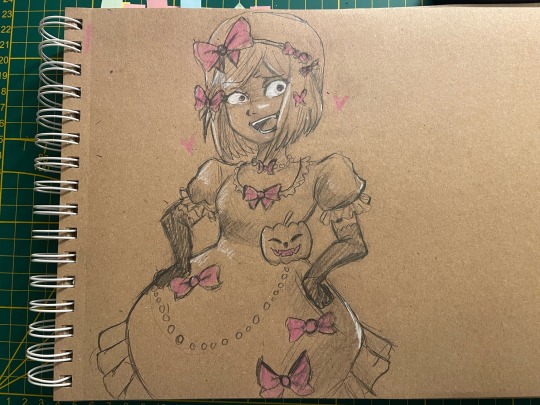
Lambdafella LAMBDADELTA for my good bobos FRIEND @ushirominya !!!!
#shutupus rex#gribouillardus cretinus#lambdadelta#umineko no naku koro ni#umineko#i have NOT read umineko btw 🦭 yet!
157 notes
·
View notes
Text
tomorrow i will have been reading umineko for one whole year
#:)#still can't believe i ended up reading at a 1 chapter a month pace#i never even intended to liveblog umineko in the first place lmao#which you can tell because the first few posts are just like 'i'm gonna start umineko'#'hey maria is a really good character and is correct about everything btw'#'battler jessica and maria are the only bitches on rokkenjima i trust and care about'#'i'm going insane what do you mean there are chapters just dedicated to failsibling drama arguments'#and then i started note taking and then after the rose garden scene i fully lost my mind#funny skimming over the 1-6 thoughtdump and seeing less than 2000 words of bullet points lmao#i love how the first couple posts of my liveblog so perfectly capture the exact moments of my descent into derangement#iirc someone sent an ask like 'you should definitely try keeping notes when reading umineko and share some theories every now and then'#not knowing that i'd already started my ridiculously meticulous note document and that this pushed me to go all in on my thoughts#although i'm gonna be honest i think *the* moment my brain broke with umineko was that 1-7 scene with kanon#literally all of this is because i Paid Attention to the fucked up servant dynamics and had the most unhinged brainblast known to man#funny to look back and reminisce on all this now lmao
26 notes
·
View notes
Text
Oh no guys, my secondary obsession is leaking over into my fanarts. Anyone else into Umineko??? Anyone? At all? I'm listening to it via livestreams by the talented NezumiVA and hoo boy i am Emotionally Invested. Anyway I've been drawing the fuck out of Beatrice bc I love a sadistic but extremely nuanced and (possibly?? it seems that way maybe???) tragic antagonist>:3
#umineko#btw if anyone plot spoils Anything in it for me it will be Jail For A Thousand Years#I'm on chapter 3#have half a mind to just. buy it and read it through on my own#but i like the livestreams cuz i can art and chore and whatnot while listening
10 notes
·
View notes
Text
I'm thinking too hard about Ronald Dorelaine even though we've got nothing but a name and vibes. Maybe it's the Umineko brainrot talking, but I feel like while the puppets are full, sapient characters in their own right, the Playfellow production staff and puppeteers are probably going to be metanarratively responsible for who they are, how they tick, what relationships they have with one another, etc, and that a lot of it is gonna come together hard when more information on Playfellow Workshop is unearthed in the narrative.
With that out of the way, here's some heavy (and sappy) speculation, going off the assumption that Dorelaine is Wally's puppeteer. Again, based on nothing but vibes, so get your grains of salt ready!
If Barnaby and Wally are not best friends by choice of their own ("November 15th 2022 - November 16th 2022/phone concept stream", 4th list entry), are they best friends because Dorelaine and Barnaby's puppeteer are in a gay relationship?
Was Barnaby jumping in during the interview both an in-character and out-of-character act of mercy on the guy playing Barnaby's part? Did he sense Ron's dismay and step in to take the pressure off him? Is Barnaby's puppeteer more straight-passing than Ron? Does he feel the need to shield the more effeminate man he loves from scrutiny?
#welcome home#welcome home theory#welcome home speculation#ronald dorelaine#wally darling#barnaby b beagle#if any other welcome home fans out there have read umineko btw holla at your boi#i have very little foundation for thinking the two will be similar but... but! i still do
21 notes
·
View notes
Note
iirc you get an ask about it a couple days ago and i just wanted to say that since you are someone who loves both orv and rgu i cannot reccomend umineko enough and i would love to see you go back to it/finish reading 🥺 orv and rgu already have quite a bit of overlap thematically imo but umineko really hones in on those areas and is such an incredible work. sorry for just like showing up in your askbox unprompted with this but i love all three of these works so dearly and this is my new agenda 🫡
ill be reading it eventually 👍👍👍 you can count on me
#narrates#dw about sending asks btw! i like getting them even if im bad at answering them#but yes im pretty excited to revisit umineko. maybe ill hit it up this weekend or something#so much stuff to read and watch so little time :(
3 notes
·
View notes
Note
mr. foods, as a fellow umineko and homestuck enjoyer, have u given any thought to using ur newfound power as an official homestuck contributer to put in a cheeky reference to the rokkenjima crew
have i given any thought... lol... yeah there might be something eventually... lol...
18 notes
·
View notes
Text
Getting into Cult of the Lamb while I'm revisiting Umineko is getting me thinking about the idea of death in the sense of "what does it mean when the permanency of death is nullified for someone" in a major way
(I'm barely into my COTL file so I don't even know if it even touches on the concept but, well, sources of inspiration are what they are, haha)
#[trash talk]#Don't publicly reply related to Umineko spoilers btw! The friend I'm reading with follows me <3
3 notes
·
View notes
Text
i will admit i have run up the playtime on a few visual novels in my time purely because the soundtrack was really good and i sat there staring into space instead of reading for 10 minutes straight
#barely through the beginning of umineko and this has happened so much so far#and ive only hear like a fraction of the songs in that game im sure#but its good tunes! i really like the song where u hear the seagulls in the quiet part#and of course the inexplicable super catchy trance music of death is also a winner#i was listening to some vn music from vns ive never played as well (as one does) and like#most of these games i'll never play because i dunno they dont interest me or i cant read em or whatever#but one or two i kinda considered like damn the soundtrack is so good. maybe i should play it#BUT LIKE. i know when i hear the good tracks im just gonna do this again. sit there listening to it loop#it is but my nature#(btw sorcery jokers ost is really really REALLY good. the game looks like a normal like action shonen thing or whatever)#(so i dunno if its good or bad or anything but those tunes man......holy shit)
10 notes
·
View notes
Text
oh i should play higurashi and umineko some day
#the 'fave women characters' post reminded me of beatrice for some reason she seems cool and i want to meet her#i started higurashi at some point but was not in the mood to read at the time so gave up on it quickly ^^;;#she actually showed up in my dreams once she was like chasing me through an amusement park or something i don't remember#kcat talks#do you need to play higurashi before umineko btw? i'd like to play both eventually but dunno if order matters
3 notes
·
View notes
Note
How old do you think lived to be in the Heian era?
Also do you think the marks on his body are like birthmarks or tattoos to mark criminals?
Not a clue about Sukuna’s death age. The Buddha reached enlightenment at age 29. Sukuna is “enlightened” so I’m going to put him at 29+ years old at death.
I’ve been meaning to do a Sukuna Tattoo post so I guess I’ll use this as an excuse. They aren’t birthmarks that’s for sure.
Sukuna's Tattoos
Notes before we start.
1) I will be mainly using the TCB scans for the manga because of their accessibility.
2) Written as of JJK 267.
(Click images for captions/citations.)
Preface
I'm drawing from a lot of sources here because documentation of Heian Era specific tattooing customs is not something I could find. The reason I’m comfortable using non-Heian sources as a reference is due to Sukuna borrowing both language and arts from other periods.
For example, Sukuna scolds Yorozu for not using a Haiku properly. The form of Haiku that Yorozu uses did not exist until the late 17th century. A good 500+ years after the end of the Heian Era (794 to 1185). The Haiku is actually derived from Waka poetry that became popular during the Heian Era. (Very short summary: Waka (Sedoka specifically) -> Renga -> Haiku)

It should also be noted that Chinese influences greatly shaped the development of arts and social attitudes in early Heian Era Japan. These influences declined over the this era as Japan looked towards itself for cultural development. Since the Heian Era was from 794 to 1185, most of the Chinese influences came from the Tang Dynasty (618 to 907).
For all these reasons, most of this tattoo analysis draws from the Tang Dynasty in China and the Edo Period in Japan. However historical Chinese tattooing in general is referenced more due to its availability.
Anyone with more historical Japanese or Chinese knowledge are free to correct me if I get something wrong.
Facial Tattoos
Let's first compare the facial tattoos on Yujikuna Megkuna and OG Sukuna.

Yujikuna and Megkuna have identical facial tattoos, but OG Sukuna lacks the markings over his nose and forehead. I think this is because those markings have something to do with Kenjaku's vessel creation. When Kenjaku casts Idle Transfiguration to wake up the Incarnated sorcerers for the culling games, they also have markings on their foreheads.

Sukuna's vessel markings might be different because his incarnation occured outside of the culling games. It could also be from his cursed object’s division into multiple pieces instead of just one. Whatever the reason, these forehead and nose tattoos prpbably hold more information about Sukuna’s relationship with Kenjaku than his past in general. All 3 versions of Sukuna share the chinstrap markings, so those tattoos likely have significance outside of Kenjaku.
Now onto what they could mean…
Sukuna has already demonstrated that he knows his Chinese literature and wordplay via Enchain/契闊 (Keikatsu). (The person who brought this to my attention may or may not have their account nuked. A doctored version of the Tweets is screenshottes here). What's important for this analysis is knowing that Keikatsu comes from a Chinese Poem.

The poem referenced belongs to the Shijing or The Book of Odes. This book is a part of the Wujing or Five Classics, a series of documents believed to be compiled by Confucius that has greatly influenced both China and Japan. Amongst the Five Classics is the Shangshu or Book of Documents that cites the use of punitive tattooing. Quoted directly from Wikipedia:
"It lists the "Five Punishments": the five primary penalties employed by ancient Chinese officials on criminals. The first (and least severe) of these punishments was the tattooing of the criminal's face with indelible ink."
In the Edo Period of Japan, the criminal markings on the face seem to only appear on the forehead. These were given to any lawbreaker as a punishment and a warning because they didn't have prisons. (Source)

These sources both suggest the facial markings are for criminals. However, there are alternative meanings that should be considered.
Kenjaku’s vessel markings are on the forehead and many of the culling game players consider themselves to be manipulated by the promises of incarnation. It’s also odd that the strongest sorcerer is unable to incarnate properly due to Yuji acting as a cage. Kenjaku is all but outright confirmed to have done that on purpose.

For these reasons, I think the following historical tattoo practice from the Chinese Song Dynasty (960 to 1279) should be considered. Quoting directly from the source:
“Tattoos for slaves were things like a label of ownership, or a brand on the forehead. There are some examples of slaves, and concubines, receiving tattoos as punishment for things like trying to escape…”
Uro is a former slave, a military slave to be exact. I go more into detail about this in my Initial Sukuna Backstory Theory. There is also the fact that Kenjaku sees the incarnated and has access to their lives/bodies like this...

They're essentially toys with built-in tracking devices for Kenjaku to monitor and tinker with as needed. The forehead and nose tattoos on Yuji/Megkuna can therefore be seen as a mark of ownership by Kenjaku. And maybe this is why Choso has one across his nose too.
There is one more meaning I can propose for the facial tattoos, though it mostly applies to the chinstrap.
Within China there are tribes that used facial tattoos for other purposes. The Dulong women had their faces tattooed to make themselves look undesirable to invaders that would abduct them for slavery and rape. (If you've read that one revised Sukuna backstory of mine, this is significant.) But more commonly, these markings became a tradition for girls coming of age.
The Ainu women in Japan also used facial tattoos for coming of age, beauty, and preparing for death. I bring up the Ainu because they’re mentioned as a non-Japanese group of sorcerers. There's also this Yuji is of Ainu heritage theory to consider. (This could link Sukuna to the Ainu by blood.)

The tribal uses are discussed here because Sukuna’s tattoos are vaguely tribal in appearance. Though tribal tattoos tend to be more detailed, his feel like a simplified version of them. I think that works well with Sukuna being labeled an unwanted child at birth. Japan has wiped out a lot of its indigenous populations and customs (see the Emishi). After all, what minority group practices haven’t been demonized and associated with criminal activity by the majority?
So the facial tattoos for Sukuna may be a marker for his vessel status, a claim of ownership, a punishment for being a criminal, a deterrent for sexual assault, or a signifier of belonging to a tribe. You can come to your own conclusions about this, after all none of this is confirmed.
Chest and Belly Tattoos
Comparing the versions of Sukuna again. (All these sections are going to start like this.)

Yujikuna and Megkuna once again have the same tatts. OG Sukuna has “C” hooked markings over his pecs instead of the “S” hooks of the other two. He also lacks the belly markings entirely. Since his belly mouth seems to be replacing the belly tattos, I think those markings on Yuji/Megkuna are a stand in for that extra mouth. The pec style differences I have no explanation for.
Due to the chest tattoos extending over Sukuna’s shoulders and onto his back, I won’t looking for possible meanings until the back tatts are addressed.
Back Tattoos

The tattoos running down Sukuna’s back appear to be the same for all 3 versions. Differences are slight enough to be considered inconsistency in the art and not deliberate.
The neck tattoos between Yuji/Megkuna and OG Sukuna differ slightly however. The bands of Yuji/Megukuna remain separate while OG Sukuna’s fuse together and extend further down his back. I don’t really have an explanation for this difference, much like the hooks differing on his pecs.
Back and chest tattoos are associated with criminal activities in Japan rather than criminal punishments because they are hidden under clothing. (Well not in Sukuna’s case, but you know…) Most notably the Yakuza have very intricate chest and back tattoos.
But going back to China, tattoos were also used as dog tags for military members and could signify loyalty, mainly during the Song Dynasty (960 to 1279, which is still within the Heian Era). Despite this, cultural opinions at the time seemed to be conflicted due to tattoos sharing an association with criminals. Quoted directly from the source:
“According to Yue Fei’s biography, when the legendary general was slandered and interrogated for treason, he tore the shirt off his body, exposing four characters tattooed on his back: “Exhaust one’s loyalty in service of the state.” This study looks at two components of the Yue Fei story—patriotic tattoos, and tattooed generals—and examines their meaning in the broader stretch of Song dynasty history. Yue Fei was not the Song dynasty’s only tattooed general who came to a tragic end.”
“This study shows that underneath the nationalist historical narrative of the Song dynasty, of which Yue Fei is a famous example, there lies a different story of social conflict within the Song state. Rather than a story of Chinese fighting non-Chinese and of traitorous and cowardly officials struggling with loyal patriots, this study offers a narrative of a social conflict between high-born clear-skinned officials and low-born tattooed military men.”
Now that sounds a lot like how the higher ups clash with the Jujutsu Sorcerers who do all the actual work. This mentality existed even in the Heian Era, where Uro was exploited as a military slave by the Fujiwaras. And since Uro is a Sukuna parallel, these tattoos could also indicate a similar type of exploitation.
There are still tribal purposes to consider. Drawing more from Chinese sources, the Dai men had body tattoos as a symbol of strength that would accentuate their muscles. Sukuna’s chest and back tatts really draw attention his brawn. The Li women had body tattoos as a right of passage and as identifiers. Sukuna’s neck tattoos in particular are similar to these ones.

So my spattering of explanations this time around for the chest and back tattoos are criminal organization affiliation, military “loyalty” claims (this is a form a slavery), decorative pieces to accentuate the muscles, a right of passage, and an identifier.
Arm Tattoos

Remember how I theorized that the belly markings on Yuji/Megkuna were a stand in for OG Sukuna’s extra mouth? That’s what I think is going on with the arm tattoos as well. The double bands and circles on Yuji/Megukuna represent the extra limbs on OG Sukuna. When this fusion is pulled apart, you get the single bands and dots on the 4 limbs.
As for their meanings? There’s the criminal markings of the Edo Period that indicate where the particular criminal is from. (Courtesy of this Reddit post.)

Since Yuji/Megkuna tattoos are more related to Kenjaku’s vessel creations, this could hint that their deal took place in Nara, Oosaka, Koufu, or Edo. (Nara is most likely because of its significance in the Heian Era.) For OG Sukuna, this is more indicative of where he first got them.
However, the single band is not for a location but rather a status—Hinin. These are the undesirables and social outcasts that were marked for their uncleanness. Sukuna was born a conjoined twin and unwanted. It’s likely these markings directly correspond to that fact.
…
(An unserious suggestion. On queer men in the US, double rings on the arm can represent how far they can fist someone.
I don’t think Gege is referencing this at all. This is just an example of why cultural context is very important to consider.)
...
There are some other meanings to be drawn from armbands specifically, but those are easier to group with legs.
Leg Tattoos
Differing from the other sections, the leg tattoos have only been seen on Megkuna and OG Sukuna. As referenced in the image below, we have the ankle of Megkuna (top left), the upper thigh of Megkuna (right), and ankles of OG Sukuna (bottom left).

Instead of having the double rings, like on his arms, Megkuna only has a single band, which matches OG Sukuna. (It’s reasonable to assume Yujikuna is the same and that OG Sukuna has the upper thigh bands too.) This further supports the idea that the double bands and shoulder rings represent the fusion of the extra limbs. Sukuna never had extra legs so there’s no need represent missing limbs.
For what they mean? I have only the non-Japanese/Chinese sources to go by. Gege may be a fan of non-Japanese cultures, but I'm not sure if that means Sukuna's design elements would borrow from them.
In other cultures, armband tattoos can represent mourning. Which ones exactly I have no idea because all the sites making this claim don’t specify them in detail. (Source 1, Source 2, Source 3) It’s honestly pretty infuriating. If you’re going to “borrow” designs from “cultures” to sell, at least cite your got danged sources.
But if we are to read these as indications of mourning, I don’t believe they’re for a person. Throughout this analysis, tattoos recurrently are associated with some form of oppression—slavery, uncleanliness, social damnation. If Sukuna’s bands are to be read as mourning, I think it’s for the loss of his autonomy and personhood.
What does it all mean?
Sukuna's tattoos are permanent marks that appear to be directly linked to his soul. How he acquired them is currently unknown. Traditional means of application can be quite painful, using metal or bamboo rods to carve skin and fill the abrasions with ink. (Here's a video if you want to watch it be applied.)
If we consider Kenjaku’s use of brands to mark and control vessels, it could be assumed that Sukuna’s tattoos are ones others put on him through binding vows for his control. They could also be symbolic in nature, hinting at his heritage and origins, indicating that he was branded an outcast at birth or even blessed by deities for protection. Perhaps Sukuna wanted the tattoos himself as an act of rebellion against the changing social norms. Whatever the reason, one thing is clear, these tattoos separate him from other humans.
Existing on the Border
I think the ambiguity behind the purpose of these tattoos this fits nicely with Sukuna and other people not knowing how to categorize his personhood. He's so strong and different that he might as well be something other than human. But he's not a curse, he wouldn't be able to used Reversed Curse Technique if that were the case. Is he a monster? A natural disaster? A god? He's kind of all these things at once by way of projection. Other people assign these labels to him and Sukuna doesn't correct them. There's something profoundly gender about it all.
And if you noticed, tattoos in ancient China and Japan have purposes that differ by gender. For women they were used for beauty and protection, while with men they were used to mark ownership and criminality. Sukuna has a melding masculine and feminine elements which is why I consider the tattoo meanings for both with him.
That sounds kind of crazy given that Sukuna very much embodies strength born of toxic masculinity. However, he actively wears women’s clothing and seems to have no qualms with being associated with feminine things. (Godbless marketing team for leaning into that.) He may have a rough and masculine speaking style, but he loves poetry and flowers.

(Sukuna is lying when he tries to deny it. Megumi's hobbies have everything to do with animals, not flowers.)
The earrings he wears, though a direct reference to the Buddha (basically it’s shorthand for how Sukuna isn’t truly enlightened yet), are another symbol of Sukuna's non-conformity. Earrings are something the Japanese government went out of its way to ban for Ainu men during the Meji Restoration after it decided they were only for women.
Even the short hair both he and Uraume wear are quite rebellious for those times, if not an indication of their lower standing. Regardless of gender, long hair was seen as desirable, high-class, and attractive during the Heian Era. (Source for men and source for women.) Most of the Heian characters wear it that way.

Notice how the servant has her hair cut shorter. Sukuna and Uraume's is shorter than that. It would be considered ugly and possibly dehumanizing. And yet when Kashimo sees Sukuna's true form, he calls him beautiful. He uses 美しい (Utsukushii) to do that.

That kind of beauty is a bit deeper than the English language can get across. From the words of someone else, "...utsukushi can express the beauty of something that catches your heart."
Kashimo isn't really wrong, but he's also not entirely right. For every panel of Sukuna looking like an ethereal god, there's another of him being an amorphous creature or a rabid goblin. All of these types of faces for Sukuna occur within JJK 253 alone.

These contradicting elements that somehow fit together are what make Sukuna, Ryomen Sukuna. He both participates in and rejects beauty. He’s crude and classy, violent and merciful, masculine and feminine. That duality, that two-faced nature is Sukuna.
I think his tattoos reflect this. Directly quoted from the source:
“Tattoos have many different symbolic meanings in Japanese culture and can denote where an individual ranked in society or serve as a permanent means of defense against evil forces or perhaps members of the animal kingdom. With the arrival of the seventh-century, the idea of tattooing one’s body in order to make it more beautiful began to lose its appeal due to the strong influence of Chinese customs in Japan—specifically when it came to identifying and tracking criminal activity. Around 720AD during the Nara Period, it appears that tattooing as a form of punishment began to infiltrate Japanese culture. Once the dawn of the Edo Period began the art form was more widely used as a punishment for criminals as at the time there was really no such thing as a prison to send lawbreakers off to.”
The purposes and attitudes towards tattoos in the Heian Era morph in the way Sukuna morphs both physically and in perception. Since Sukuna is the Fallen One, that means he must have been Honored One first. What caused him to fall remains a mystery, much like the meanings behind his tattoos.
One last thing...
A small caveat in relation to everything else, Sukuna referring to himself as The Fallen is the only time he has introduced himself.

He’s not given someone his name nor identified himself as anything other than a former human (which was internal). Combined with the ambiguous nature of his form, tattoos, and origins, I don't think it would be wrong to read him as someone who has transcended gender.
#cactus yaps#Wow I went down a research rabbithole for this.#I don't think this counts as weeb posting. This is more in line with Erika Furudo. Yeah I'm Erikaposting now.#Beatoposting is when I suggest Sukuna lacks a gender.#Where's that one meme that's the enby flag but with a hyper masculine bearded dude in front of it going “Any Pronouns Lmao.” That's Sukuna.#I am once again asking what the hell happened to Sukuna and how much of it is Kenjaku responsible for.#Read Umineko btw.#ryomen sukuna#jujutsu kaisen#jjk asks#asks#jjk spoilers
37 notes
·
View notes
Text
without love there is no meaning vs without love it can't be seen
3 notes
·
View notes
Text

um kinzo DID "exist" in the study that morning actually. believe women!!!!
#umineko liveblog#btw i am fully cackling to myself while reading this entire scene this is all so fucking funny sdlkfjslkdfjslkj
21 notes
·
View notes
Text
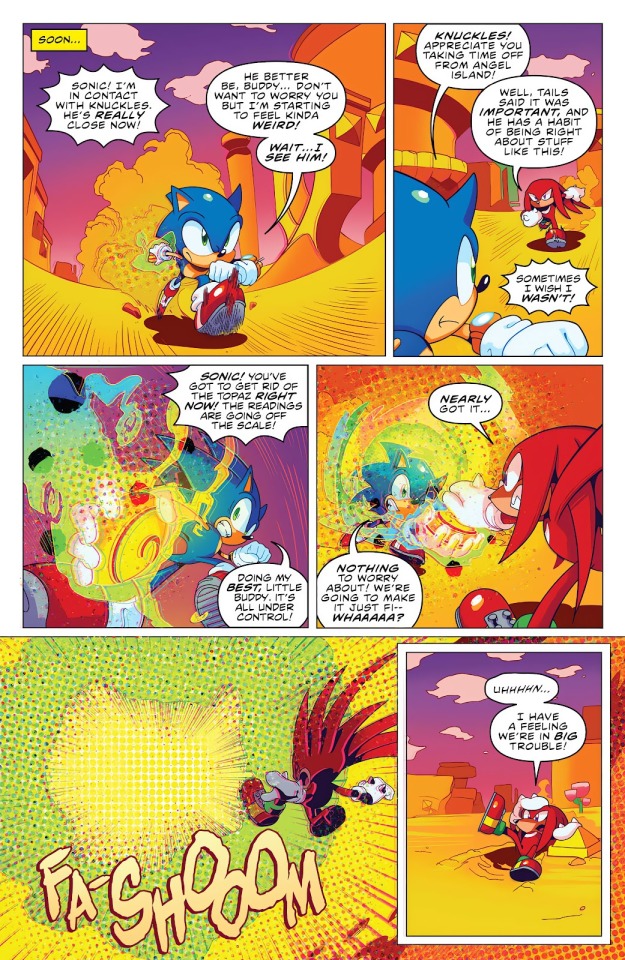
Sonic the Hedgehog's 900th Adventure is out, and I got to draw the story written by Sonic the Comic's Nigel Kitching! Me and Rik and Reggie worked together to try and do a nice story that's a heartfelt pastiche of the vibes of Sonic the Comic.
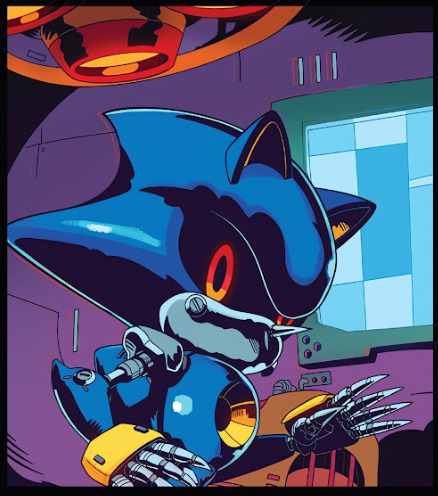
Some thoughts after the cut
I got a bunch of pages as reference, not just for stuff like poses, but also how did the Metallix get shaded, how did the mechanical design of locations look, how did effects look, how did panelling work.
I didn't do a perfect job of pastiche-ing Elson, but I think it worked well enough.

Here's some location planning, the small lab, on multiple angles, so I know where all props are, etc. Normally I prefer more "logical" mechanical design, so the very Jack Kirby-esque tech stuff here was directly referenced from multiple StC bits.

I also did some studies of poses from Elson's stories but with modern Sonic models. (ignore the Umineko joke Amy and Tails drawing where Amy's holding a sketched hammer but most people interpret it as a syringe lol)

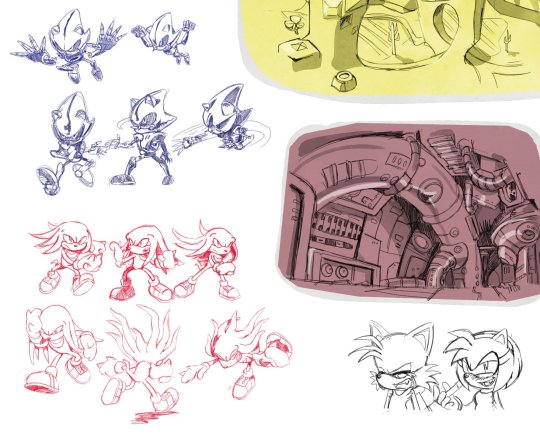
BTW 2nd time I got to homage this panel from StC Issue 147 (not a Kitching story but an Elson one)
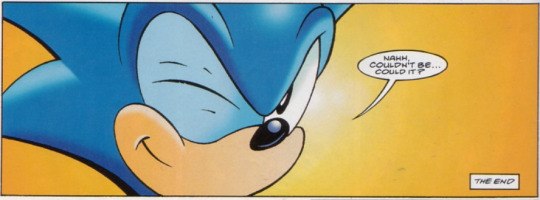
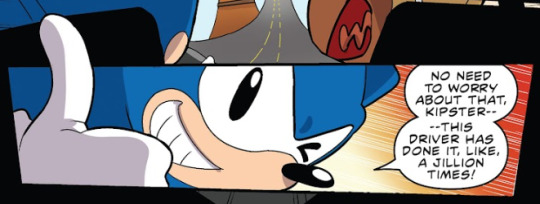
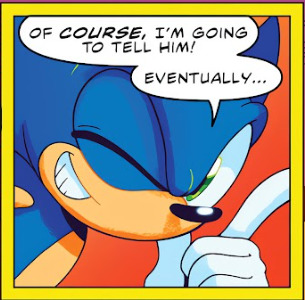
Mr. Kitching was a wonder to work with, nice script, very descriptive but also leaving space for leeway in interpretation, etc.
Would enjoy working with again! And I hope you guys enjoy reading it.
#ppdpplart#sonic the hedgehog#idw sonic#sonic the hedgehog's 900th adventure#sonic the hedgehog 900#metal sonic#knuckles the echidna
257 notes
·
View notes
Text
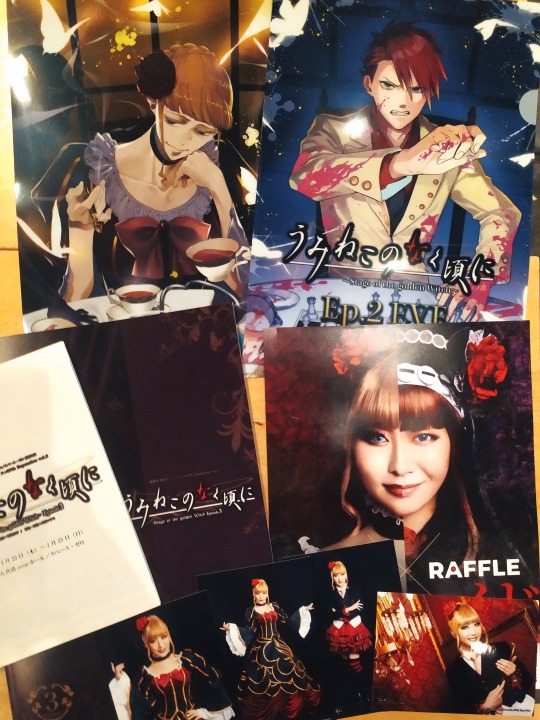
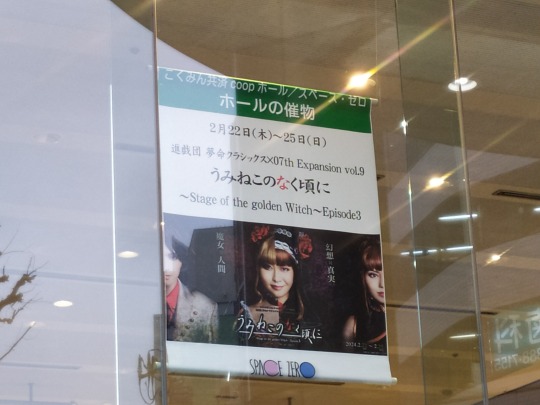
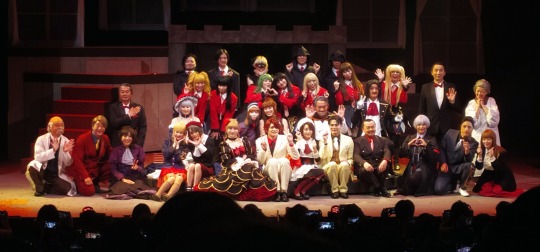
I saw umineko stage ep3 today!! it was amazing. the quality level is insane. I got goosebumps several times and it even managed to make me tear up... everyone's performances felt like they all know their characters so well now 🥺🙏 the lights, costumes and choreography were all perfect too
some thoughts (major umineko spoilers obviously):
young eva/evatrice's performance in particular was just. literally perfect? the way she delivered her lines, carried herself, her laugh resounding onstage and the little things she did when she wasn't the center of attention were all 100% in character. she was adorable during the ceremony where she becomes the new beatrice, introducing herself to the goats and giggling w the 7 sisters, and she was absolutely terrifying in rosa's and maria's death scene. also mad props to the costume designer(s) who did her sailor outfit that turns into the witch outfit almost instantly
everything beato's actress did had me go :] there's a lot of cute beato scenes in ep3 and she was adorable in the goofy, endearing way og beato is in the story while still being cool and fun when needed in the other scenes
and last but not least eva's actress did an amazing job too, especially during the emotional scenes of her character (when she solves the riddle, finds the gold, hideyoshi's & george's deaths). her lungs' strength is impressive lol. it's been 4 hours and I still clearly remember her screams
overall I loved the way so many of the actors and actresses would just do little things when they were on stage but not in the spotlight/not talking, like the chiesters whispering in each others bunny ears instead of their human ears/covering their bunny ears because of loud noises, or the 7 sisters just jumping around and messing w each other, maria taking her notebook out of her bag and reading it, etc. they weren't just standing doing nothing and it always felt very in character, too. there was always something new no matter which part of the stage you're looking at
rudolf's actor looked and acted like he came straight out of a yakuza movie? ik he was already like that in the previous episodes but for some reason I felt it even more this time. might be because of the fight against the sisters before he and kyrie die (which was probably my favorite action scene btw. really cool choreography). I'm not complaining though. made me like the character even more
speaking of rudolf. at some point during one of the scenes where the adults discuss beato's first letter, he just... started massaging hideyoshi's shoulders? he did that for at least a full minute before hideyoshi's actor nodded as thanks and he stopped. I have no idea if this was part of the script or if the guys just decided it on their own??
when gohda does his night check of the mansion right before his death he was actually walking in the aisles with his lantern before he got up on stage!! he got to tell a joke and do some fun stuff before being killed and never being relevant again. rip
beato asking battler to give her a new name now that evatrice inherited hers, ronove on the side of the stage writing a stupid nickname on some paper to show her only for her to get annoyed, rip the paper from his hands and stomp on it
I don't know if this was done on purpose or not, but when eva fires the shot that blinds jessica and jessica accuses her of being the culprit, pointing at some random direction since she can't see anymore, she actually pointed at shannon's corpse on the sofa behind her. it could very well just be a coincidence. but. yea
krauss drinking straight from the fucking bottle during the golden land party scene at the end and getting completely smashed
ange!! she was so cool and cute. she punched the goats. I can't wait to see her in ep4 😭
battler literally Just Standing There at the very end, when ange and beato start duking it out before the episode's over 🧍
the curtain call was super cute. everyone got together to pose for the cameras before they realised beato wasn't here so they had kinzo cry for her in the infamous kinzo way and she graced them (and us) with her presence :)
battler's actor: "so we'll need your support -and- your gold for episode 4 to happen"
cat nanjo be upon ye
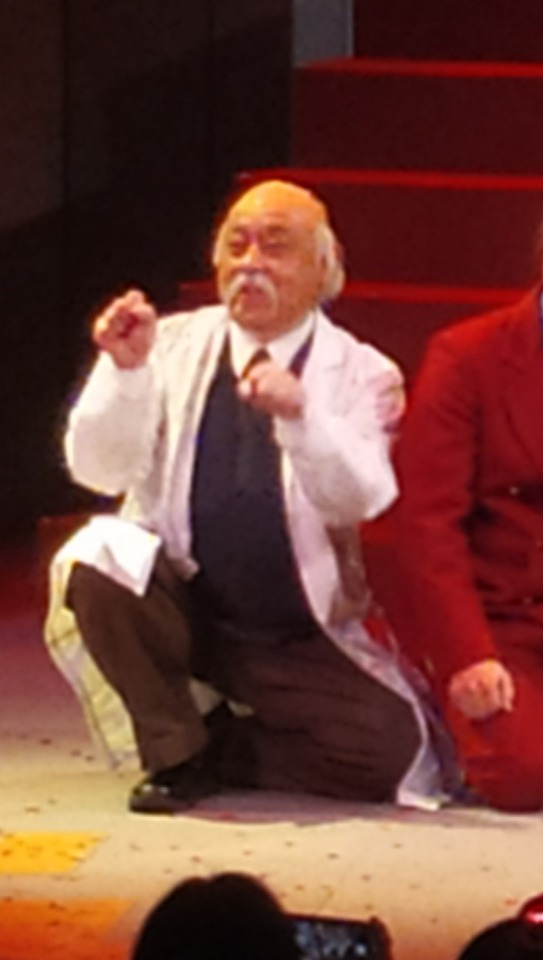
87 notes
·
View notes